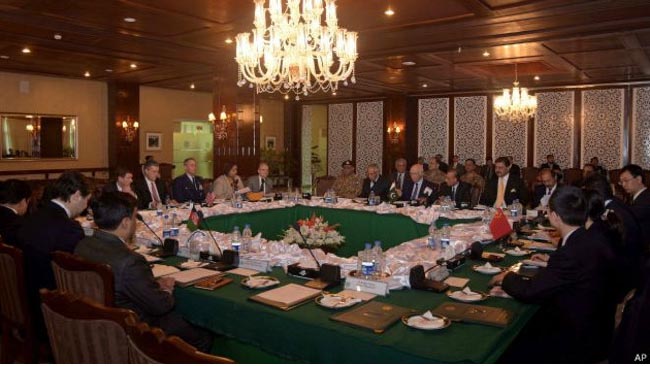ISLAMABAD - Pakistan on Monday opposed preconditions in talks between the Afghan government and the Taliban and suggested incentives to encourage the insurgents to come to the negotiations table.
Sartaj Aziz, Pakistan's foreign affairs adviser, floated the proposal in his speech at the opening session of the four-nation talks to explore ways for promoting reconciliation process in Afghanistan.
The quadrilateral process involving Afghanistan, China, Pakistan and the U.S. was launched during a meeting of the four countries on the sidelines of the Heart of Asia Conference held in Islamabad last month. Afghan President Ashraf Ghani and Prime Minister Muhammad Nawaz Sharif were present in that meeting, which was also attended by senior officials of China and the U.S.
"The primary objective of the reconciliation process is to create conditions to bring the Taliban groups to the negotiation table and offer them incentives that can persuade them to move away from using violence as tool for pursuing political goals,"Sartaj Aziz said.
"It is, therefore, important that pre-conditions are not attached to the start of the negotiation process. This in our view will be counterproductive," the Pakistani adviser said.
The participants would share ideas to end the deadlock in the Pakistan-brokered talks between Kabul and the Taliban.
Aziz defended political solution to the problem and that reconciliation through a politically negotiated settlement is an arduous and complex task. He said proper sequencing of actions and measures in the process would be significant in paving the way for direct talks with Taliban groups.
"Threat of the use of military action against irreconcilables cannot precede the offer of talks to all the groups and their response to such offers. Distinction between reconcilable and irreconcilables and how to deal with the irreconcilables can follow once the avenues for bringing them to the talks have been exhausted."
He argued that certain Confidence Building Measures can play a key role in encouraging Taliban groups to join the negotiation process, suggesting a "realistic and flexible roadmap for charting the course of action to broadly define steps and phases, but avoid unrealistic targets and deadlines."
The Taliban have not officially commented on the four-nation talks, however, section of the media quoted named Taliban leaders as saying that they would not hold talks with the Afghan government.
The Taliban leaders said they want talks with the U.S. first to talk about an end to the invasion, removal of restrictions from their top leaders and release of Taliban detainees under the U.S. custody.
Deputy Foreign Minister of Afghanistan, Hekmat Khalil Karzai, is representing a five-member delegation in the first meeting of the Quadrilateral Coordination Committee.
Chinese special envoy for Afghanistan, Deng Xijun, the U.S. special representative for Afghanistan and Pakistan, Richard Olsan and Pakistan Foreign Secretary Aizaz Chaudhry are leading their delegations. (Xinhua)

